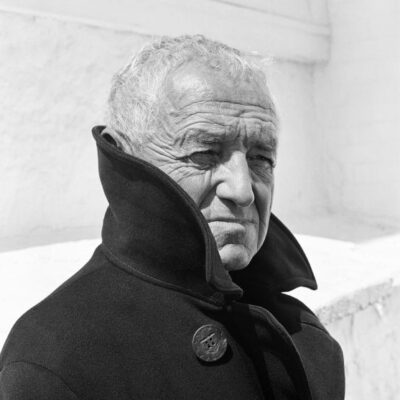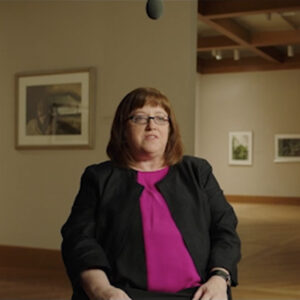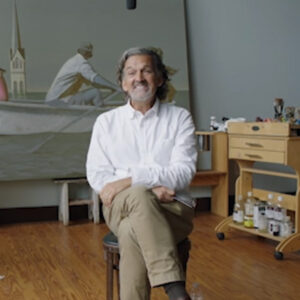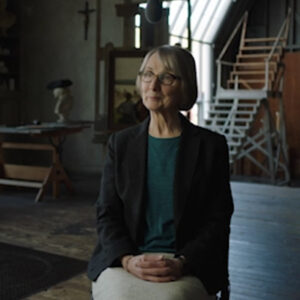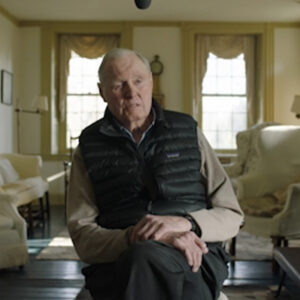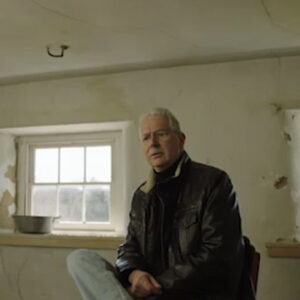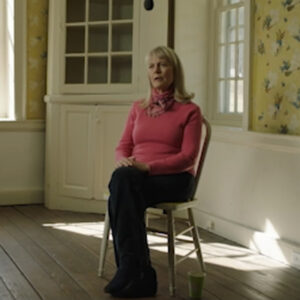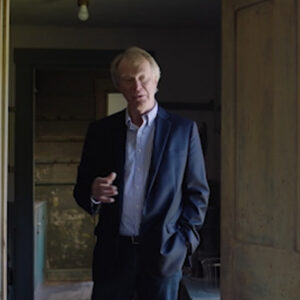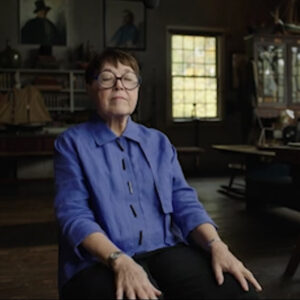Speaker I like the idea of you going with your dad to paint, and I was sort of talking about early memories of him physically. What is he like when he’s painting? And is there a difference between painting portraits inside the house when he’s out in the world?
Speaker I completely lost him. As I said, he was the best babysitter because we could just go off and do whatever we wanted, because once he got in and what he is working on, he was completely oblivious to us. So I when I really got excited about wanting to paint, then I you know, I would wander around and create paintings at also exactly as he was doing.
Speaker And is he a talker when he’s painting or is he completely in his mind?
Speaker No, and not at all. You’re pretty much his mind, I think, imposing for a few times. I suppose for him he would. You felt his intensity. And of course, he was such a wild painter. That’s what flies in the face of a lot of people’s perception of Andrew Wyeth, particularly his imitators who starred in one side of the canvas and work across.
Speaker He threw paint, knocked things over. As he said half his paintings were accidents. And, you know, just to break the sort of frozen ness of of representation, pain, every blade of grass. But then, you know, in his tempers, I mean, he was a man of contradictions in his temper is, of course, it finally was boiled. I mean, look at Christina’s world crises, every blade of grass, every strand of Kristina’s hair. But it began as total wildness.
Speaker I think one of the best gifts that your mom could have given him was those books, what Kerner’s and Christine, as well as very intense long books that have all the drawings. Right. As you see those papers. Sure.
Speaker Covered with stains and footprints. And now that was I mean, that’s the way and it was by design. He wanted to break the whole thing. He didn’t want to be, you know, a studio painter, which, again, you know, as opposed to his father, who was a studio painter and and went in to see why the parents would go out painting. And he brought all his equipment and easels. And when my father hardly ever used an easel, if you look at me, the painting would be hanging off his knee and whatnot. He’d be throwing water and whatnot. I mean, a complete chaos.
Speaker What do you take from his journey as a painter and apply to yourself as a journey?
Speaker Oh, my God. Oh, what a light question. Ten words or less. Yeah, but I’m talking about, you know, we’ve talked about him trying to break free. I mean, did you feel he made.
Speaker Not really, I didn’t have I mean, because he wasn’t a domineering force over me. My mother was a bit and there was huge battles with her.
Speaker I remember one time when she found all half-Finished drawings of mine, she demanded that I finish each one of them. Why? I don’t quite know. But anyway, so that and still, I guess, a certain discipline in me. But but now my relationship, my father, I think was entirely different than his relationship to his father. Um, I think, you know, I always told my father we were kind of almost equals I mean, it was sort of two guys who have me working at the same thing. I think with his father, it was definitely he was the teacher and the son was a student.
Speaker That’s perfect. I, I think that I mean, I always think of you when I see photographs of you to this beautiful photograph of the two of you. The friends were downstairs in one of the buildings.
Speaker We look like these colleagues versus, uh, on, uh, profile, but. Huh, that’s right.
Speaker I’m wondering if you could talk to me about there’s a question I have and I love your thoughts on it about your father’s popularity in Japan. Do you have any thoughts about the fact that the culture of Sandhurst?
Speaker When it came to me, when I went to Japan, I went to the there was a big exhibition of three generations that traveled the world and went to Tokyo and opened in Tokyo. And the dinner before we had this dinner and this the Japanese and this beautiful box was put in front of me at dinner.
Speaker And I unwrapped and open and in it were two lima beans. Well, that’s Andrew Wyeth. You know, the spareness, the sort of not the the bravado and so forth, getting down to stealing things down. And, you know, I mean, they were the best line of beans I’d ever eaten, but they were just two of them, you know. And and I think that side of Andrew Wyeth, I’m assuming, is what appeals to the Japanese.
Speaker So there’s a there’s a simple representation of one thing, one idea.
Speaker Yes.
Speaker The simplicity of things, the total clear vision, not the confusion, not all the madness, the sort of an object gets imbued with a certain I mean, like that lima bean, you know, it becomes amazing. And Andrew Wyeth, I think with some of his best work, does that where all of a sudden he takes something that’s rather ordinary, mundane, not very spectacular, and listening to something else for someone.
Speaker You mentioned that your father and unlike your grandfather who sort of commanded the room, your father like to sort of be quiet, just disappeared. But he did a great deal of wonderful talking about his work. And it’s been recorded in archives.
Speaker And he did, I think I don’t know, that did sort of flew in the face. I couldn’t quite understand it. But again, there’s this funny dichotomy where, you know, every so Andrew, why the loner, you know, doesn’t like people when it really was Betsy, my mother, who didn’t want people around and so forth. And and so she kind of imposed that that I mean, when I grew up, you know, they were never a dinner party at our house. There were never a house guest. It was very spare. And a lot of that’s my mother. So and my father was fascinated, me, particularly in Chadds Ford, you know, they had their house. Everything was very spare, no flowers, just the paintings were the central thing and so forth. And then you go to the studio, it was like a bomb hit it, you know. So again, it was those contrasts that sort of NCOIC know.
Speaker I mean, it was it’s all the contrast of my father would battle against. And, you know, out of it came the work. It makes for a very interesting film for a filmmaker. I mean, yeah, I think layers of.
Speaker Oh, yes, very complex. And and and that’s why I think his work resonates still. I mean, it isn’t just every blade of grass. It isn’t just, oh, it looks like a photograph. And so, I mean, I think a large part of the audience that appeals to them. But if you really look at his work, it’s pretty scary stuff. And it’s pretty kind of, you know, I mean, it’s kind of like Robert Frost poem, you know, it’s you can say it’s some horse in the woods with a sleigh in the snow, but really read it. It’s a lot more than that and pretty scary.
Speaker One of the people we’ve talked to was a M. Night Shyamalan, who makes scary movies was very. Yes, yes.
Speaker That sort of reads reads to him.
Speaker Well, your father had kind of a rocky road with the world of critics and our critics. And I wonder if he ever spoke to you about that. I will give you advice.
Speaker As somebody who did sort of ride the wave, I think it was disappointing to him, but it had no relevance to his work. I mean, you know, I mean, to be perfectly honest, of course, he was would be disappointed if somebody would just savage what are you doing? But but, you know, the enviable thing about painting is if you can contain. You to paint it really has no real effect, it’s not like theater where they closed the theater film, you know, bad reviews and so forth, which, of course, drives the critics mad, you know, and the art critic said, you know, he kept on painting, producing more books.
Speaker In some ways. I wonder if it provided some fuel for lack of a better term, like I’m going to show them.
Speaker Well, I think there was fuel in the sense that we’re doing this, you know, and that’s where we had this sort of bond that we’re kind of working together. And I mean, it’s something I felt at least that, you know, we’re kind of at the ramparts and the hell with them, just keep doing it and gave us even more impetus to get delve even deeper into what we’re doing rather than appealing to to this element.
Speaker And is there anything that you take, I mean, against another kind of big operation question? But other in my life as a few things that my dad said to me over the course of my life, that are words that come back to me, that whenever I’m sort of trying to get Susanin or struggling with something, I find them comforting.
Speaker Are there any words that he’s given you that that even that probably the last words he said to me literally in the hospital room, he you know, I was leaving. He was going to have surgery the next morning. And he grabbed my hand and looked me and said, give them hell.
Speaker And that was it, you know, so and he did in sort of a twinkling, you know, I’d give them hell.
Speaker That’s a great that’s what I. Yeah.
Speaker Did you get that was the beginning of that clear. I think you guys stepped on each other. Yeah.
Speaker So I might ask you to retire now, OK. Yeah. And just so I was asking words of advice that you use and I’m going to call again, OK?
Speaker Yeah, yeah, yeah.
Speaker Are there any words of advice that you’re probably getting that you sort of keep with you and.
Speaker Well, yes, really his his final words to me that night in the hospital when he was to have surgery the next morning and we were saying goodbye.
Speaker And I leaned down and he pulled me and looked at me right in the eye and said, give them hell.
Speaker And I remember that.
Speaker I wish we could call it a movie that you do and you have a brother and I want to talk about like what’s the age difference between you two?
Speaker What are sort of early memories as kids here?
Speaker And I mean, you know, like any children, Nikki always was in a different kind of thing. He was building model airplanes and so forth, wasn’t had no interest in any whatsoever. So there was no plan. And then Nikki went I mean, I used to feel terrible for him. We would the four of us would drive up to we went to a boarding school that he wanted to in New Hampshire. And the four of us would go, God, we all the three of us would be in tears, leaving him weeping our way. Nikki couldn’t have been happier. And I think probably to get the hell rid of us and whatnot. And I kept putting myself on him. Oh, my God, if I had to do that, then I wouldn’t be able to pay and I wouldn’t be able to do this and that and so forth. But so, you know, we diverged quite a bit. But, you know, I adored Nicky and he he has. And why he looks so much like my father is just frightening and and has a lot of his qualities, which is great.
Speaker And my final question is just to reach because we’re outside, I want to make sure we have the. The idea that you started painting by observing him and sort of how that unfolded, it seems very organic to me. How are you?
Speaker Yeah, well, I began really painting by, uh, my father used to paint Christmas cards for everybody in the family and a few friends, and they were little paintings, little watercolors and a little white sort of index card. And the two of us would sit in front of the fireplace remembering Chadds Ford and he’d do these wonderful watercolors and of a leaf blowing in the snow or something. And so I became electrified by this. So I started doing my own my own little cards, my own paintings. And I always feel I kind of backed into painting. I mean, it was for cards, for Christmas cards to to to my family. And it wasn’t well, now I’m going to be a painter and now I’m going to get an easel and I’m going to get brushes because all the tools were lying there. And so it would have been unnatural not for me to done it, although back to Nicky. Nicky grew up, ate the same bacon and eggs and as I and really had no interest in it. So who knows what the chemistry is. But but at a very early age, I, I mean, I left school, you know, in the fifth grade and and really people said that age had, you know, but I mean, that’s really what I wanted to do was just that’s all I wanted to do. And still, I’m so glad you say I know. Maybe someday I’ll jump out of bed and say, damn, why can I play football? Can you.
Speaker I doubt it. I got the corporate boardroom.
Speaker And so the two of you would paint. Was it often that you paint side by side or was it.
Speaker No, no. Just a Christmas, you know, three weeks before Christmas. And he would end up doing, you know, 30 of these things and, you know, mean with night after night after night. And that’s really where I in the strongest that’s where I learned to paint.
Speaker And the final one is if we could go back over the choice of where do you where is your father buried and what was that decision and what do you think about it?
Speaker He’s buried at the Olsen farm. And I think it was my mother’s decision. And I think it’s it’s perfect. I mean, there he is in this field, in the iconic house and, uh, Christianity drawings of her gravestone and so forth. They’re drawings that he had done. So, um, I think it’s just absolutely perfect.
Speaker You know, it’s, uh, it’s it’s the whole story is still there.
Speaker Yeah. It’s great. You know, anything saying that.
Speaker Oh, the one thing we had talked about was the life of the old sense, like what it was like for them.
Speaker Oh, we take of that in this town. Right. You did a perfect job. That’s what makes them like the voice sound doesn’t. Yeah. Get in the way.
Speaker So maybe those observations of you as a young teenager or a well, before I was a teenager, sort of an eight, nine and ten, I would go to the old since my father obviously was working there when I sort of grew up. So I when I became interested in painting in and I didn’t drive a car, so I’d ride with him and I’d end up wandering around and painting and the Elson’s became, you know, part of our family, or more importantly, we became part of their family. And, uh, and so it was it was a wonderful experience. I had this enormous house, these amazing people. Uh, their life was in credit. I didn’t sense it was difficult. But I look back on it now. I mean, no electricity, no running water, no refrigeration, no telephone, nothing. And, uh, and but it was magic in that place. And and both of them I mean, there were huge conversations there. End of the conversation was very up. Yes. This or that, you know, and but it was the whole cats wandering around. It was an amazing world. And, uh, and and it certainly hooked my father for, you know, forty some years. And, uh, and as I say, I painted there for quite a few years.
Speaker Could you describe Christine and our various personalities? You remember them?
Speaker Um, well she she was wonderfully motherly and whatnot. It would bake biscuits and so forth. And yet, you know, to most people she looked like a witch. I mean she was a sort of amazing faces, enormous nose and so forth. Alvera was a man of very few words post my father very little didn’t I think felt Cynthy done Christine so much he wasn’t going to pose again. And so there’s a little bit of that going on. But it was, uh, they were, you know, just remarkable. And when you grew up in the spring and the variety, Siba, was to go to Christine. And allows for, you know, to see them for the first time and then spend the next few months living with a.
Speaker And I guess you live nearby? Yeah, only about half an hour away, so it wasn’t.
Speaker And again, it’s this world that my father then sort of morphed into, as he had done in Pennsylvania, I think, with the Kerner farm. And and I mean, the Kerner farm has all the sort of things of his father and his father having died nearby and so forth.
Speaker The Olsen thing was something that was I think, you know, he I think the work he produced there is just absolutely extraordinary, you know.
Speaker Do you think he connected with Christina? And because it’s only for this, I mean I mean, you connect with her because of her physical development and the fact that she was bound to that house.
Speaker I don’t think so. This was just the reality of it. And I think the whole story of her, their father, who had been a sea captain and he was injured and he was in a wheelchair, that so that the Olsen house was tied to the sea, had all sorts of ramifications of the sea of poor Clyde, where NC Wyeth was. But it was back up this river and here it was sort of farm country. And I think that just hopefully the added interesting thing to me was, you know, Phyllis, my wife was on crutches, was taking her there for the first time and Christine meeting her. And here was this young girl as she was on crutches and whatnot. So that was a kind of 50 dynamic.
Speaker But Christine wouldn’t use crutches, as I know, wouldn’t use them. But I mean, but being paralyzed, that, you know, we’ve done a great job, sir. I’ve always enjoyed what good. You know, I well, I think it’s wonderful what you’ve done so far, so hopefully I can.

